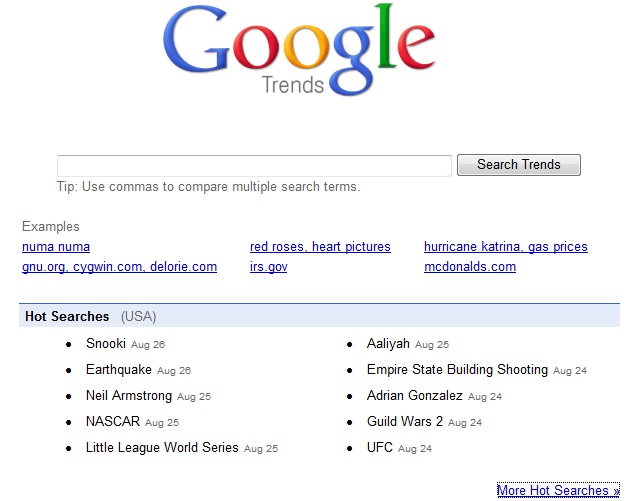 Let’s face it, the Internet is much more crowded today than it was a few years ago, and it looks like that trend is going to continue. The only barrier of entry for setting up a website to publish content on is having fingers to type with, but the Microsoft Kinect and Apple’s increasingly smart input devices promise to take care of that in a few years. If you can’t write content that is new and exciting then you’re probably not going to attract very many visitors as a blogger. If your blog is full of recycled information readers and search engines will always prefer the original source.
Let’s face it, the Internet is much more crowded today than it was a few years ago, and it looks like that trend is going to continue. The only barrier of entry for setting up a website to publish content on is having fingers to type with, but the Microsoft Kinect and Apple’s increasingly smart input devices promise to take care of that in a few years. If you can’t write content that is new and exciting then you’re probably not going to attract very many visitors as a blogger. If your blog is full of recycled information readers and search engines will always prefer the original source.
Even though it’s tough, coming up with fresh, original content is still possible, and doing so on a consistent basis will reap big rewards with your readership. Readers are more likely to share original content than they are quality pieces written on topics that have been covered before, and creating fresh content is the only way to attract readers that have been in the industry for a while.
Here are 5 tips that will help you remain relevant by staying fresh.
Follow the News
Every time a new social network opens their doors, it’s an opportunity for my website, Social Media Sun, to cover a story that no one else has ever written about before. We also get the chance to write fresh articles on existing networks every time someone updates their platform, or releases a new feature. Whether it’s Facebook making a major change to their layout that no one likes, Google penalizing backlinks from social bookmarking sites, or Klout changing their scoring algorithm, every time they bring out something new, we get the chance to do the same.
It’s a good strategy because those changes are the ones that users are interested in. You don’t always have to be the first person to cover breaking news, but it’s always helpful to publish early and more importantly to get all the important facts and write one of the best pieces on a given subject. You should always be keeping an eye out on Google Trends and Twitter Trends for topics in your niche.

Search terms that are trending on Google represent topics that are peaking readers’ interest at that time. Websites like Gawker are designed to target hot topics with short news pieces.
Check Out the Competition
Before you pen an article on a topic that isn’t obviously fresh, it’s always a good idea to do a cursory Google search and scan through the results to see what you’re up against. Use Google’s Keyword Tool to survey the demand, and competition. If there are results that closely match your working title, take a look at what the other site has published.
It’s easier than you think to pen an original piece of content that has the same exact advice as someone else’s earlier work. If someone asked you what tools you needed to change the oil in a car, 90 percent of respondents are going to mention the oil, filter and the pan to catch the oil in. When you attract a decent sized readership, people are going to notice if your posts are similar to a post on another industry blog.
If some of your points are the same, try and make sure that it’s only the most important advice; change supporting points, and expand your list to cover fringe topics. There is usually more than one way to skin a cat, so check to make sure you aren’t copying someone else’s work because you’re both writing about the best way.
Don’t Check out the Competition
It always makes an article sound smarter if it’s well researched and references other works, but you want to avoid getting your research from other blogs. There are already too many bloggers that write their material by re hashing information previously gathered by someone else, or combining information from multiple sources. If you end up finding a statistic in a Tech Crunch article, it is almost always sourced from somewhere else.
Follow studies back to their original source and paraphrase their findings instead. It will usually be from an educational institution or a private research firm. It’s alright to let writers whom you enjoy reading influence your voice, but if you get all your ideas from other blog posts you’re probably not the type of expert it takes to be an effective blogger. Search engines are starting to penalize blogs and other websites that consist of predominately recycled information, making original content more valuable than ever.
Consult your Brain Trust
Do you have a group of friends that work in the same industry as you? How about your employees? Have you actually paid attention to what your customers and clients are asking you? Most industry blogs will write themselves if you let them.
Ask the employees that take care of customer care to make note of any problems or stories that they haven’t heard before. Usually whatever people are talking about at the water cooler is what they’re going to look for in new blog posts. We often solicit post topics from the Social Media Sun Facebook group. Several other blogs run surveys or install plugins that will allow readers to ask questions or suggest topics for future posts. If one person is having trouble finding an adequate solution for their problem, it is very likely that other people will have the same problem in the future.
If you don’t have any of these resources, social media is best listening tool available. Every time a fresh story hits the news that people are interested in, Facebook will inevitably group 3-10 posts regarding that topic together on my timeline. There are several applications that extrapolate trending data and sentiment from social networks. You just need to be careful when you’re covering this week’s hot topic. If you can’t report fresh news first, or spin it in a fresh way, your only option is to do it better. On the Internet, it’s often more effective to be the first than it is to be the best.
Pull from your Experience
You may not realize it, but sometimes your oldest lessons are just as applicable today as they were in 1992. A lifetime spent working in the same industry is a wealth of experience. You learned everything you know from somewhere, and every person, experience, moment and lesson is another blog post.
Some of my favorite blog posts of all time consist of stories told by today’s industry leaders from when they were my age. Often I’ll find that our experiences are basically the same, and even if I don’t have the option of handling a situation exactly the same, I learn a lot from hearing about how they handled it.
Everyone will need a different stimuli or environment to cultivate the most creative content possible. Experiment with all these practices and see which ones work best for you. I think you’ll find that if you’re truly writing on the right subject, you’re going to have more things to blog about than time to blog.
- Blogging Isn’t a Rocket, It’s More Like a Roller Coaster - August 19, 2025
- Value vs. Expectations: The Fight for Startup Survival - July 31, 2025
- The Evolution of Marketing: From Catalogs to Cat Blogs - November 8, 2022
- How to Make a Tweet This Link - February 5, 2022
- Dramatically Improve Marketing Results with Advanced Analytics - September 20, 2021
- The Next Chapter for Social Media Sun - June 4, 2013
- Optimizing Your FAQ to Maximize ROI - December 5, 2012
- Weapons of Influence and Klout’s Role in Marketing - November 17, 2012

Hey Adam! nice article! especially the thing about google and twitter trends! nice stuff!
When I was actively writing for Yahoo!, I chose a news topic from the Google Trends every morning, and since trending topics was a big part of the selection process for features, my articles were featured almost every day. Gawker uses a leaderboard to display trending topics. It can really be a huge driver of popularity, and traffic to your website.
LOL< check out the competition, don't check out the competition. I agree, I do unfollow people I find myself migrating towards unconsciously so I can be fresh!
Don’t you hate when that’s the case 🙂 Especially with the better articles, I find myself trying to write responses to them every time I try and write a new post!
Excellent article with practical, hands-on, action tips. It’s rare to have someone with your knowledge give insider-tips like this. Thanks Adam!
Thank you for the nice compliment YBS! I am glad I could help, and i hope you find my future posts helpful as well. You’re welcome to join our Facebook group, it is open to everyone, and I will proactively try and help with your specific needs.
Great tips and advice…especially advising people not to gather info from Blogs – it’s really obvious when that is done.
Yes, and with Google’s new algorithm changes that specifically target duplicate content, even posts that use entirely different words but are semantically identical are in jeopardy!